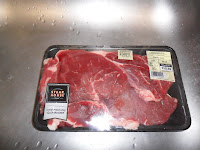In honor of Chip the iPod's retirement and the arrival of Frank the iPod (he's pink!), I've been sorting through my songs to create new playlists. While I've been wending my way through titles and genres, it's almost been like taking a trip back through time as certain songs reassert themselves and reignite memories of why they were important to me or what about them connected them to me on some emotional or gut level. Because of that, I thought I would occasionally jot down thoughts or impressions on some of them. And if someone could tell me where I managed to pick up 6,000+ songs, I'd be eternally grateful...
I tend to have a love/hate relationship with Andrew Lloyd Webber. I like some of his earlier stuff but he tends to get a little "moon in June" for me with a lot of his later works and
Cats just makes me want to call the pound.
JCS, though, is a composition that, done right, I can go back and listen to time and time again. The Australian cast is one of those, largely on the strengths of John Farnham singing the role of Jesus. It's also one of the first portrayals of Jesus that got me to see him as a real person as opposed to some cardboard cutout on a felt board in Sunday School or some literary figure talked about from a pulpit.
Too many versions of
JCS have the actor playing Jesus singing the lyrics in a style that can best be described as...well, milquetoast-ish. Jesus just moves along, pats Mary Magdalene on the head, tut-tuts at Judas (oh, that scamp!), whines a bit in the Garden of Gethsemane and then meekly heads offstage. It's like the aural version of Max Von Sydow playing Jesus in that movie where he speaks...almost as...slowly...as...James T...Kirk...and...never blinks. In a way, many productions of
JCS become more about Judas than Jesus - especially if you have an actor playing Judas who can sing well (most assuredly
not looking at you, London cast!
Judas should not sound like Donald Duck with a lisp). Farnham's Jesus, on the other hand, is present in a way many are not. He sings with passion. His Jesus has emotion and drive. He knows what he needs to do, where he needs to go and how little time he has left to get there.
I think the thing I really love about Farnham's singing of
Gethsemane is that he captures the human side of Jesus. A lot of treatments of Jesus during this crucial time tend to gloss over the turmoil he was in because we know the end result: he submitted to the Father and went to the cross. Yet Mark 14 (NLT) characterizes Jesus as beginning to be
"filled with horror and deep distress." The entire song takes place within verses 35-36 (NLT):
"He went on a little farther and fell face down on the ground. He prayed that, if it were possible, the awful hour awaiting him might pass him by. 'Abba, Father,' he said, 'everything is possible for you. Please take this cup of suffering away from me. Yet I want your will, not mine.'" These words sound so...simple in a way, almost bloodless, when they are just read as part of the chapter. It's part of a story we all know very well and sometimes familiarity breeds detachment.
For me, however, the song lyrics really show how Jesus might have pled with God for another way to go, to not have to walk the path that had been set for him. Since he was fully human as well as fully God, would he not have been afraid as well especially since he knew what was coming? Emotionally spent? Just plain physically exhausted? Even maybe a little angry? He'd spent thirty-three years on Earth with preaching God's message the thrust of the final three. Yet his disciples - the ones hand-picked by the Son of God - still had their thick as brick moments; never mind the majority of the general population who would shortly be jeering him on a cross and demanding the release of Barabbas instead of an innocent man. Even the disciples he'd asked to come with him into the garden fell asleep instead of keeping him company and would shortly run away and deny Him.
Like the rest of us, Jesus had free will. He did not have to do what God was asking of him and He was certainly not powerless by any means. If Jesus had chosen to exercise his free will, that would have been it. God's plan would have been over. There would be no church, no salvation through God's son. The whole of Christianity as we know it would simply not be.
And I think that's the other thing that really hits me about this song: the ultimate capitulation to God's will when He didn't have to. It was a choice Jesus had to make the same way we have to make that choice when God asks us to do something. In a way, the Gethsemane scene strikes me as an unanswered prayer of Jesus to God (perhaps His only unanswered prayer?) in that the cup was not taken away. In it, Jesus sings in his prayer to God about all his feelings; his anger, his fear, his frustration; even asking why he should go through with this and die. He initially expresses the "agreement" that he will die as almost a dare:
"Just watch me die".
The first part of the song is all the "human" reasoning and questioning, the demanding to know "why" we should do what God wants us to. We're human and we want to know the outcome of our choices. The bridge where the music swells and the guitars do their screaming is reminiscent of the swirling emotions and thoughts that crash in on each other as you pray and try to hear God's voice amidst all the confusion of a difficult or painful decision. Then, there is that brief moment of silence when the guitars stop and just before the lone piano starts up again which is like that moment of clarity when you just...get it. You know what God has said to do and it's your choice and you choose to do it even if you'd rather not. So, the last verse is Jesus leaving behind the human need to understand or demand answers and acquiescing, submitting, to the will of God (
"God, thy will is hard/But you hold ev'ry card") even though He knows the way ahead will not be easy and that there will come a moment where He will be totally and utterly alone. Even the last line, that last soft
"before I change my mind" isn't Jesus being indecisive. He isn't waffling. He has submitted to the Father and is going to follow His will. When I hear that line, it's like that moment when you make the decision to do something monumental or frightening or distressing or any other adjectives (good or bad) that involves faith. You've made the decision to do it but you're still human and there is still that vestige of nervousness or anxiety accompanying your decision. That last line of the song is the big, shaky breath you take before you put faith into action.
So, er, yeah...that's me rambling on about why this song will pretty much always be on any playlist I make...
(YouTube doesn't have an embed code for this song but a URL for it can be found
here)









































